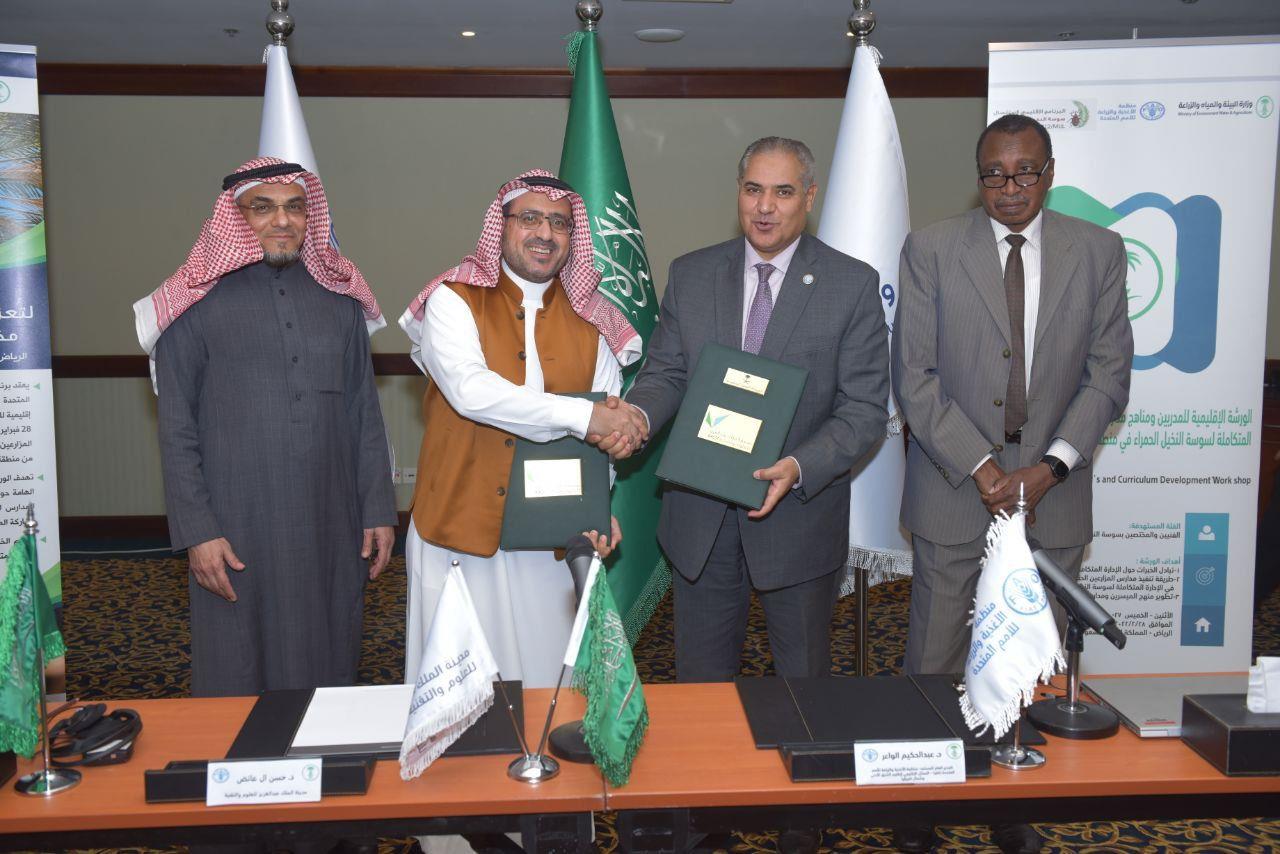Official launch of the FAO programme on Red Palm Weevil (RPW) Eradication from the Near East and North Africa (NENA) Region Thursday 17 February 2022

On Thursday, February 17, 2022, in Al-Ahsa Governorate, Saudi Arabia, and as a side event of the establishment meetings of the International Date Council (IDC), the FAO programme on RPW Eradication in the NENA region convened a meeting to mark the launch of the field activities of the regional programme.
Dr Suliman Al-Khatib, Director General of Plant Resources of the Ministry of Environment, Water and Agriculture (MEWA), and representative of the Kingdom of Saudi Arabia in the RPW programme addressed the meeting on behalf of His Excellency Eng. Ahmed Ayyad Al-Khamshi, Undersecretary, MEWA. The meeting was addressed by the Assistant Director-General of FAO and Regional Representative for NENA region Dr AbdulHakim Alwaer and Dr Ibrahim Al-Dukheri, Director-General of the Arab Organization for Agricultural Development (AOAD). Dr M. Ali Bob represented the IDC on behalf of the Executive Director Dr Abdulrahman S. Al Habib. The meeting was also attended by Dr Abdul Aziz M. Abdul Karim, Assistant Undersecretary for Agriculture Affairs Ministry of Works, Municipality Affairs and Urban Planning, Kingdom of Bahrain, and Dr Hassan Alayied, Director of International Cooperation and Partnership, King Abdulaziz City for Science and Technology, KSA. The meeting was attended by Eng. Ayman Al-Ghamdi, Director General of the Plant Health Department, MEWA, KSA, and members of the RPW Management Programme in the Kingdom. The meeting was also attended virtually by more than 30 members of the RPW Programme, members of the programme committees, a group of experts, leaders of programme technical working groups (TWGs) and national focal points representing countries in the regional RPW programme.
The RPW is a serious pest of date palm, coconut and ornamental palms that attacks about 40 palm species in more than 50 countries, causing extensive damage to palm trees and other plantations and threatening production, farmers' livelihoods and the environment.
The regional programme to eradicate the RPW was established in partnership with many countries and organizations and with generous support from the Kingdom of Saudi Arabia, the United Arab Emirates and the Sultanate of Oman. FAO with international partners and countries in the region has developed a framework strategy for the eradication of the RPW and developed the regional programme to eradicate the RPW in the countries of the NENA, as one of the most affected areas, in order to help countries improve strategies for eradication of the RPW and control programmes to contain the infestation and spread of weevil and reduce palm damage. The programme addresses the gaps in the management of the RPW in areas of scientific research, technology transfer and capacity building.
The programme completed the development of work proposals for five TWGs in areas of RPW monitoring and early detection, the participation of farmers, the development of control protocols and techniques, study of the social and economic impact of the RPW, development of phytosanitary systems and border protocols, and the production of certified palm propagation materials for sustainable management of the RPW. Twelve work packages were prioritized to be tackled by the five TWGs in the next two years, and eight cooperation agreements were signed with programme partners:
1. The Mediterranean Agronomic Institute (CIHEAM-Bari), Italy
2. Arab Organization for Agricultural Development (AOAD)
3. International Center for Agricultural Research in the Dry Areas (ICARDA)
4 International Center for Biosaline Agriculture (ICBA)
5. The Near East Plant Protection Organization (NEPPO)
6. The Phoenix Research Station (PRS), Spain
7. The University of Genoa, Italy
8. The Arab Center for the Studies of Arid Zones and Dry Lands (ACSAD)
Dr Thaer Yaseen, FAO Plant Protection Officer, NENA region and technical director of the RPW programme presented a report on the progress of the activities of the FAO programme on RPW Eradication from the NENA region. The leaders of the five TWGs presented progress reports on accomplishments and planned activities. Discussion followed with comments from Dr Ibrahim Jboory, President of the Arab Plant Protection Organization, Dr Mohamad Abdullah of ACSAD and Eng. Fidaa Al-Rawabdeh of the AOAD, the Regional Office for the Arab Mashreq, and other speakers.
Signing a cooperation agreement with King Abdulaziz City for Science and Technology, KSA
Later in the programme, a cooperation agreement was signed between the FAO programme on RPW eradication and King Abdulaziz City for Science and Technology for "developing, testing and validation of RPW early detection systems”.
A cooperation agreement will be signed, later this month with King Faisal University, Kingdom of Saudi Arabia on “evaluation of selected RPW control technologies for sustainable management of the RPW”.
Thanks to the Kingdom of Saudi Arabia for organizing this event and for the great support provided for the success of this important regional programme.
